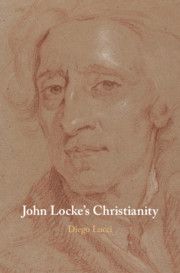Book contents
- John Locke’s Christianity
- John Locke’s Christianity
- Copyright page
- Contents
- Acknowledgments
- Introduction
- 1 The Context and Background of Locke’s Biblical Theology
- 2 Engaging with Scripture and Heterodoxy
- 3 A Scripture-Based Moralist Soteriology
- 4 The Soul and the Last Judgment
- 5 The Trinity and Christ
- 6 Religious Toleration and Christian Irenicism
- Conclusion
- Bibliography
- Index
Conclusion
Published online by Cambridge University Press: 24 September 2020
- John Locke’s Christianity
- John Locke’s Christianity
- Copyright page
- Contents
- Acknowledgments
- Introduction
- 1 The Context and Background of Locke’s Biblical Theology
- 2 Engaging with Scripture and Heterodoxy
- 3 A Scripture-Based Moralist Soteriology
- 4 The Soul and the Last Judgment
- 5 The Trinity and Christ
- 6 Religious Toleration and Christian Irenicism
- Conclusion
- Bibliography
- Index
Summary
Locke’s religion, although expounded unsystematically in his public as well as private writings, is an original and internally coherent version of Protestant Christianity, grounded in his painstaking analysis of Scripture. Locke’s endeavor as a theologian was typical of a biblical theologian who paid particular attention to the moral, soteriological, and eschatological meaning of Scripture, which he considered infallible. Moreover, virtually all areas of Locke's thought are pervaded by a religious dimension, and his reflections on several epistemological, moral, and political issues denote a markedly religious character. His religious views also influenced the development of various Protestant currents, such as Unitarianism, Baptism, and Methodism, despite the mixed reception that his thought met with among English divines in the late seventeenth and eighteenth century. Briefly, an accurate examination of Locke’s writings on religion, as well as his philosophical, moral, and political works, belies depicting him as a "secular" philosopher. Locke was the archetype of a "religious Enlightener" endorsing reasonable belief as the coordination of natural reason and divine revelation.
- Type
- Chapter
- Information
- John Locke's Christianity , pp. 209 - 217Publisher: Cambridge University PressPrint publication year: 2020

